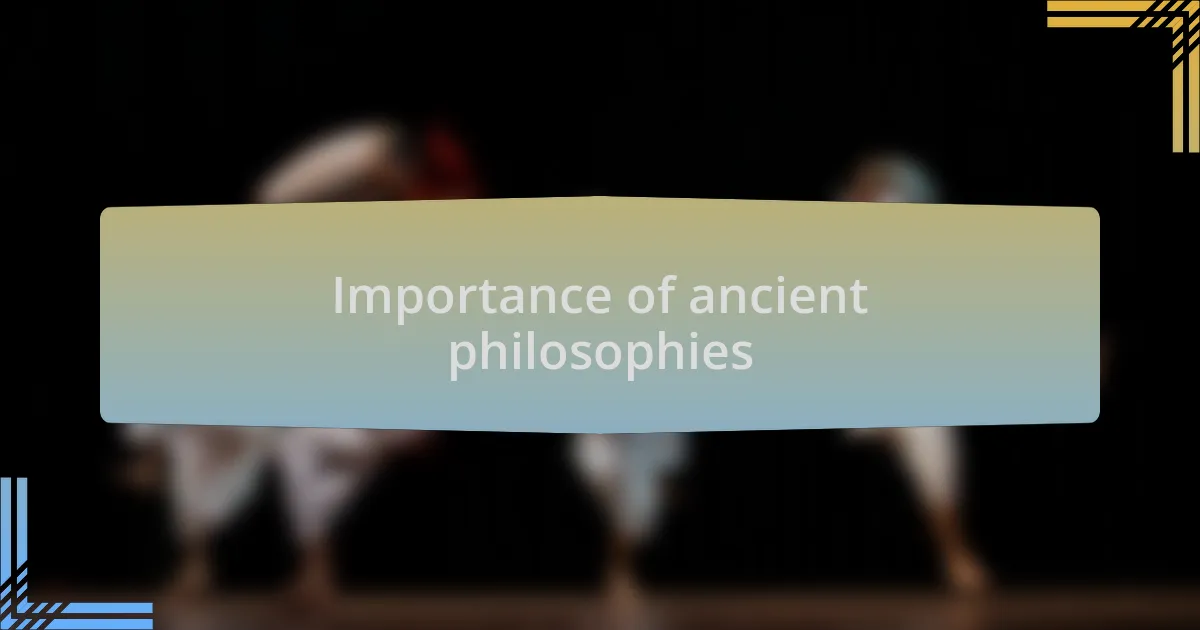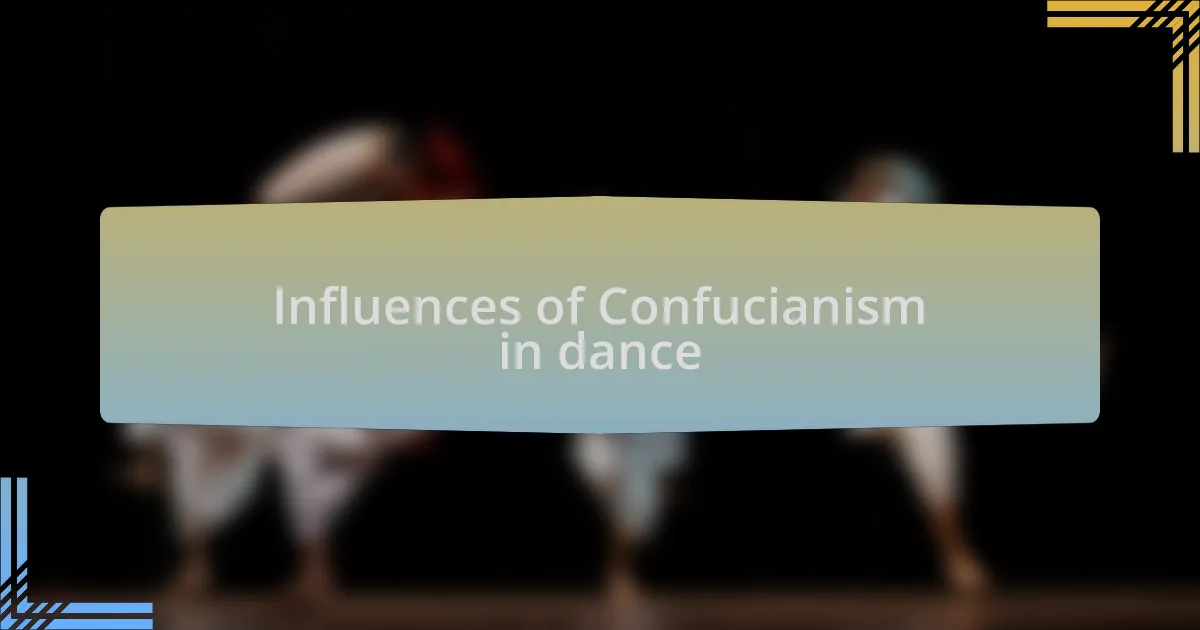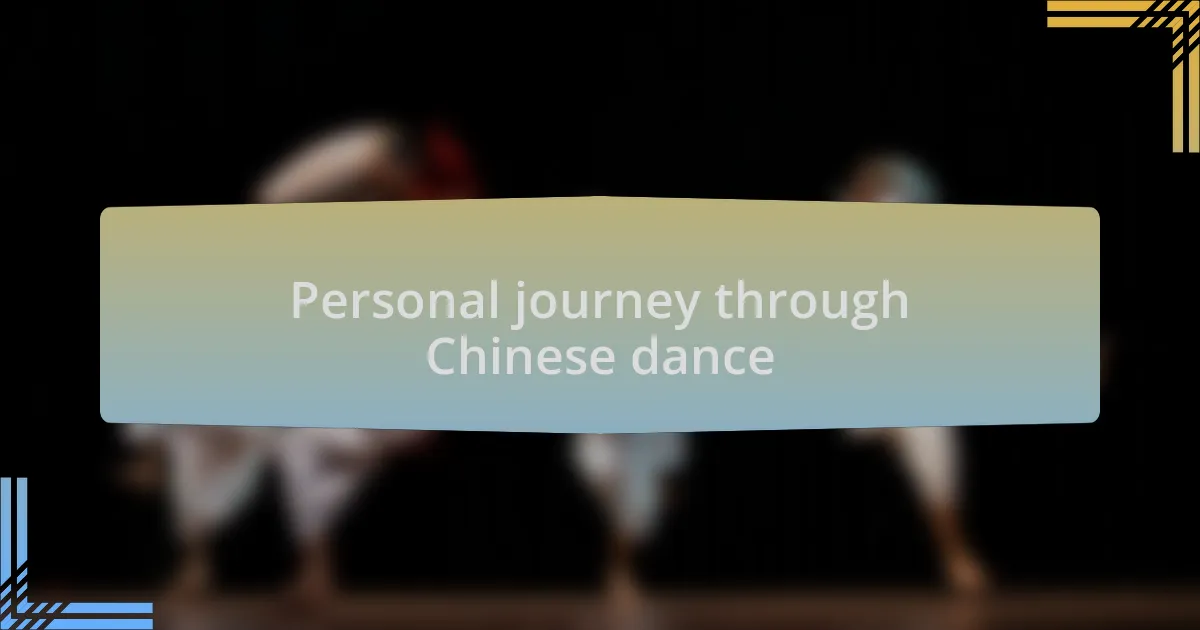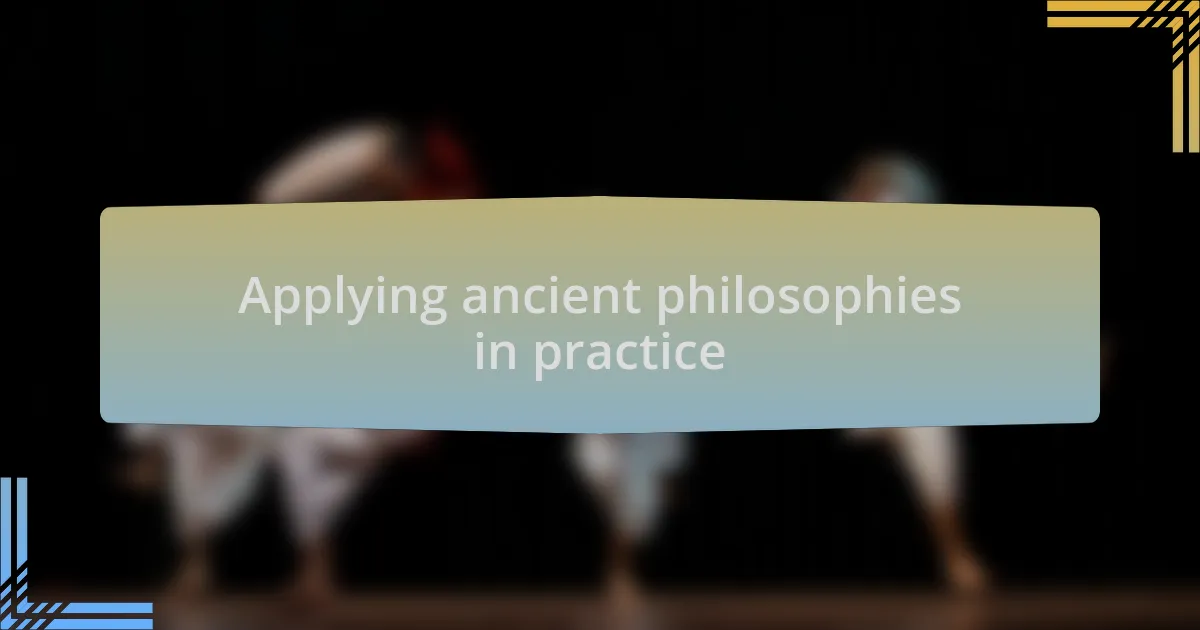Key takeaways:
- Classical Chinese dance reflects ancient philosophies, particularly Confucianism and Daoism, emphasizing harmony, respect, and balance in both art and life.
- The practice of dance fosters a deep connection to heritage, allowing performers to honor traditions and embrace their personal journeys.
- Incorporating ancient philosophies into dance enhances emotional expression and fosters a sense of community and continuity across generations.

Understanding classical Chinese dance
Classical Chinese dance is not just an art form; it embodies thousands of years of history and cultural expression. I remember my first performance, where the movements felt like a conversation with the ancestors, each gesture steeped in meaning. Have you ever felt that powerful connection to the past while practicing or watching a dance?
As I delved deeper, I discovered how every posture and expression tells a story, often reflecting ancient philosophies like Confucianism and Daoism. This dance form emphasizes grace and fluidity, which resonates with the Daoist concept of harmony in nature. I often find myself pondering: How can simple movements convey such profound wisdom?
The rigorous training involved in mastering classic techniques also taught me about discipline and respect for tradition. It’s fascinating to witness how every leap and spin teaches us about balance, both physically and in life. Can you see how this art is not just about performance, but a way of living in alignment with centuries-old values?

Importance of ancient philosophies
Ancient philosophies serve as a foundation for understanding not just dance but life itself. I often reflect on how Confucianism highlights values like harmony and respect, which I strive to embody in both my daily interactions and performances. Have you ever considered how the principles of these philosophies can shape your perspective on art and relationships?
Moreover, the teachings of Daoism emphasize a natural flow, which I find mirrored in the movements of classical Chinese dance. Each time I step onto the stage, I am reminded that there’s an intricate balance between effort and relaxation. This idea resonates deeply with me; it’s like a reminder that life, much like dance, flourishes when we allow ourselves to be in sync with the rhythm of existence.
Ancient philosophies also challenge us to think about our roles within society. As I practice, I’m conscious of the collective nature of dance, realizing that each performance is a dialogue between the past and present. Have you felt that tug of responsibility to honor the traditions that shape your art? It’s a profound realization that connects me to generations before me, enriching not just my performance but my identity.

Influences of Confucianism in dance
The principles of Confucianism profoundly influence the expression of values through classical Chinese dance. When I perform, I often recall the importance of respect—both for my fellow dancers and the traditions we represent. This mutual respect fosters a sense of community on stage. Have you ever felt that shared energy when dancing in unison with others? It’s electrifying and speaks to our collective spirit.
Another tenet of Confucianism that resonates in my dance practice is the concept of filial piety, or respect for one’s parents and ancestors. Each movement I execute feels like an homage to those who came before me. This connection imbues my performance with depth and intention, reminding me that I carry their legacy forward. Is there a moment in your own practice where you feel closely linked to your roots?
Furthermore, the idea of moral cultivation in Confucianism inspires me to continuously refine my artistry. Dance, after all, is not merely about physical expression but also about inner growth. I strive for an alignment between my values and my performance, channeling my dedication into each gesture. How often do we think about the moral implications of our artistry, and how can we elevate our performances into acts of integrity and reflection?

Personal journey through Chinese dance
As I delve deeper into classical Chinese dance, I find that my personal journey is intricately woven with the art form’s narrative richness. I remember my first performance, when the rhythm of the drums resonated within me, making me acutely aware of my breath and movement. Did you ever experience a moment where dance felt like a bridge to something greater? For me, it was transformative.
Practice sessions often reveal a surprising emotional depth. Recently, while rehearsing a new piece, I was struck by the story behind the movements—how they symbolized joy and sorrow intertwined. I paused, feeling tears well up, realizing that each gesture carries weight and history. Have you ever felt this connection to the story of your dance? It reminds me that each performance can be a reflection of our own lived experiences.
Every time I step onto the stage, I carry a piece of myself, my fears, and my aspirations along with the stories of those who danced before me. There’s a moment, just before the curtains rise, where my heart races with anticipation and vulnerability. How do we dare to be seen in our art? For me, recognizing the journey of self-expression through dance has become a profound source of empowerment.

Applying ancient philosophies in practice
Applying ancient philosophies in practice often feels like integrating the wisdom of the past into my movements. For instance, when I consider the concept of Daoism, I strive for balance and harmony in my choreography. There’s a moment in every routine where I consciously let go of control, allowing my body to flow with the rhythm, echoing the Daoist principle of ‘wu wei’ or effortless action. Have you ever noticed how surrendering can amplify your performance?
Incorporating Confucian values gives my practice a deeper meaning as well. The emphasis on respect, especially towards the traditions and teachings of previous dancers, serves as a guiding principle for me. I remember a mentor advising me that each practice session is a dialogue with those who came before us. How often do we consciously connect with our roots while moving? For me, this connection enriches each step I take, fostering a sense of community across generations.
As I embrace Buddhist philosophies, I find that mindfulness transforms my approach to dance. During rehearsals, I focus deeply on each movement, allowing my spirit to merge with the choreography. I recall a moment of clarity while executing a particularly challenging sequence—my mind cleared, and I felt present, truly embodying the art. Isn’t it interesting how stillness can lead to the most expressive moments? This practice not only enhances my performance but nurtures my emotional well-being as well.